
Switzerland is not a member state of the European Union (EU). It is associated with the Union through a series of bilateral treaties in which Switzerland has adopted various provisions of European Union law in order to participate in the Union's single market, without joining as a member state. Among Switzerland's neighbouring countries, all but one are EU member states.

The relations between Estonia and the United States have been constant and strong since Estonia regained its independence in 1991. The United States and Estonia are allies and partners.

Interstate relations between Bulgaria and Canada were established in 1966. Both countries are members of NATO.

Bulgarian-Montenegrin relations are foreign relations between Bulgaria and Montenegro. Relations between the two were originally established in 1896, while Montenegro had been a kingdom and Bulgaria had exercised special self-governing status while nominally part of the Ottoman Empire. Bulgaria recognized Montenegro on June 12, 2006. The modern countries established diplomatic relations on August 2, 2006. Both countries are full members of the Council of Europe, and of NATO. Bulgaria is an EU member and Montenegro is an EU candidate.

Canada and Georgia established diplomatic relations in 1991. Both nations are members of the United Nations.

The Hellenic Republic recognised the Republic of Estonia on May 19, 1922. Greece never recognised the Soviet annexation of Estonia. Both countries re-established diplomatic relations on October 2, 1991. In April 1997, Estonia has established an embassy in Athens. The Greek embassy in Tallinn opened in January 2005. Both countries are full members of the Council of Europe, the European Union and NATO.

Bulgarian–Turkish relations are foreign relations between Bulgaria and Turkey. Bulgaria has an embassy in Ankara, two general consulates in Istanbul and Edirne and a chancellery in Bursa. Turkey has an embassy in Sofia and two general consulates in Plovdiv and Burgas.

Diplomatic relations between Austria and Bulgaria were established in 1879. Austria has an embassy in Sofia and an honorary consulate in Burgas while Bulgaria has an embassy in Vienna and an honorary consulate in Salzburg.
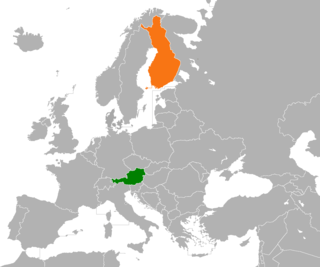
Foreign relations exist between Austria and Finland. Austria recognised Finland on 13 January 1918. Both countries established diplomatic relations on 19 July 1918. Austria has an embassy in Helsinki and 6 honorary consulates. Finland has an embassy in Vienna and 8 honorary consulates . Both countries are full members of the European Union and of the Council of Europe. The two countries became members of the European Union in 1995.

Foreign relations exist between Australia and Estonia. Australia first recognised Estonia on 22 September 1921. Australia was among the first countries to re-recognise Estonia's independence on 27 August 1991. Both countries re-established diplomatic relations on 21 November 1991.

Canadian-Estonian relations are foreign relations between Canada and Estonia. Canada recognised Estonia in 1922 and re-recognised Estonia on August 26, 1991. Canada is represented in Estonia through its embassy in Riga (Latvia) and an honorary consulate in Tallinn. Estonia has an embassy in Ottawa and 4 honorary consulates. There are around 22,000 Canadians of Estonian descent. The two countries are part of the NATO military alliance.

Estonia–Germany relations are foreign relations between Estonia and Germany. Estonia has an embassy in Berlin. Germany has an embassy in Tallinn. Both countries are full members of the European Union, NATO, OECD, OSCE, Council of Europe, Council of the Baltic Sea States, HELCOM and WTO.

Bulgaria–Hungary relations are foreign relations between Bulgaria and Hungary. Both independent countries have had diplomatic relations since 1920. They were on the same side during World War I and World War II. Since 2016, the two countries have commemorated their friendly relationship on 19 October, which is known in Bulgaria as the Day of Bulgarian-Hungarian Friendship, and in Hungary as the Day of Hungarian-Bulgarian Friendship.

Lithuania – United Kingdom relations are foreign relations between the United Kingdom and Lithuania.
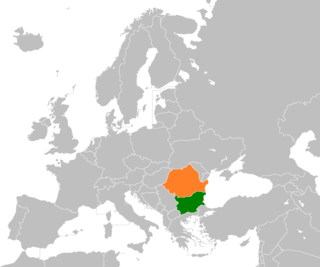
Bulgarian–Romanian relations are foreign relations between Bulgaria and Romania. Bulgaria has an embassy in Bucharest. Romania has an embassy in Sofia and three honorary consulates. There are 7,336 Bulgarians who are living in Romania and around 4,575 Romanians living in Bulgaria. The countries share 608 km of common borders, mostly along the Danube. Both countries are full members of the European Union and NATO. The two countries joined NATO in 2004 and then the European Union in 2007.

Bulgaria–Italy relations are foreign relations between Bulgaria and Italy. Both countries established diplomatic relations in 1879. Bulgaria has an embassy in Rome and a general consulate in Milan. Italy has an embassy in Sofia. Both countries are full members of the European Union, NATO, OSCE, Council of Europe and the World Trade Organization. Italy has given full support to Bulgaria's membership in the European Union and NATO.
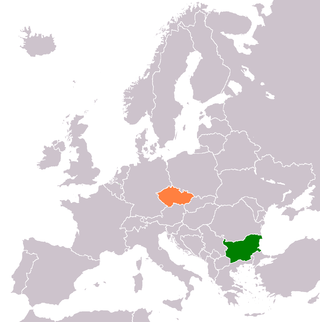
Bulgaria–Czech Republic relations are foreign relations between Bulgaria and the Czech Republic. Diplomatic relations between Bulgaria and Czechoslovakia were established on 27 September 1920, after ratification of Neuilly treaty. They were severed on 1 June 1939 and were restored on 10 October 1945. Interwar relations were deeply influenced by Yugoslavia, Czechoslovakian ally, but Bulgarian rival. Czechoslovakia had to balance between Bulgaria and Yugoslavia. The most important aspect of Bulgaria–Czechoslovakia relationship was trade. The Czechoslovakian interwar export to Bulgaria varied between 3% and 11% of the Bulgarian import. Otherwise it was about 0.5%. Czechoslovakian export was slowly forced out by Germany in the late thirties, but not as much as France or United Kingdom.
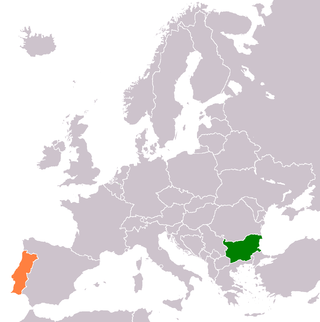
Bulgaria–Portugal relations are foreign relations between Bulgaria and Portugal. Diplomatic relations between both countries were established in 1925. They were severed in 1945 and were restored on 24 June 1974. Bulgaria has an embassy and an honorary consulate in Lisbon. Portugal has an embassy in Sofia. Both countries are full members of the Council of Europe, European Union and NATO. Portugal has given full support to Bulgaria's membership in the European Union and NATO.
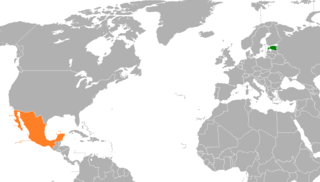
The nations of Estonia and Mexico initially established diplomatic relations in 1937, however, relations were broken after the annexation of Estonia by the USSR in 1944. Diplomatic relations were re-established in 1991. Both nations are members of the Organisation for Economic Co-operation and Development and the United Nations.





















